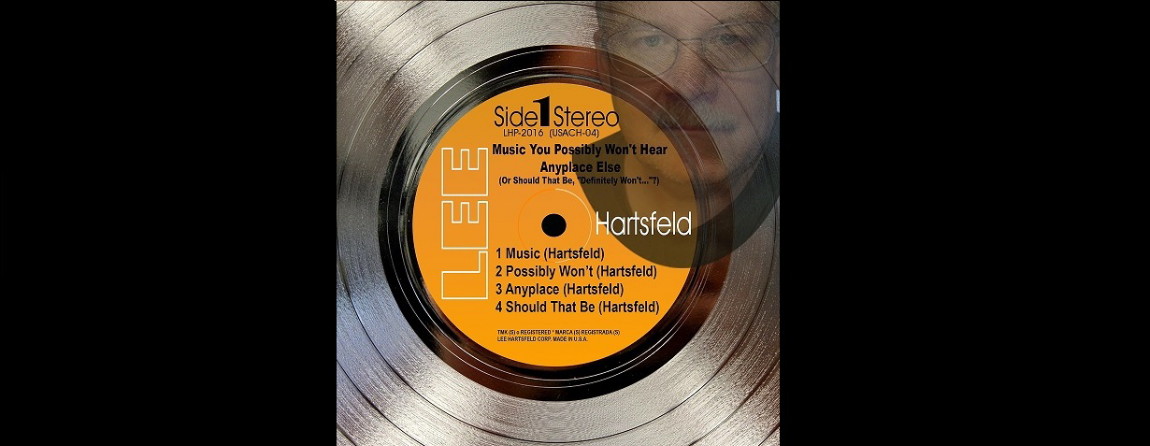Another round of assorted artists, starting with the 23-member Wesley Bell Ringers choir of Christ UMC, Salt Lake City UT--we'll hear three very cool selections, starting with my all-time favorite Yuletide song, Jingle Bells. What can I say? It's the catchiest melody ever devised. The bell choir is beautifully recorded, especially for a private-pressed 1979 effort, and, at times, its sound is downright surreal. I say that as a big compliment. At the time of this recording, the choir had a bass boom-a-gong to add low tones. Far out. We also have the return of Ferde Grofe's 1934 Christmas Eve, as expertly played by organ master Barron Smith on "The world's largest concert organ," the John Wanamaker Organ, Philadelphia. And the organ indeed sounds awesome. No year given at Discogs, but a past eBay listing mentioned 1956, which seems probable. Here's the lowdown on Christmas Eve. As with his Grand Canyon suite, Grofe appended a very old-fashioned play-by-play text of the type dating back to the late 1700s!
Plus, three selections by Jay Cyman and the Musicalaires. And if that sounds like a polka group, you are correct! New York polkas, to be precise. My favorite Cyman track: Jolly Old St. Nicholas, whose words come from an 1865 poem by Emily Huntington Miller, as published in the children's periodical, The Little Corporal. I'll need to check my Little Corporal stash to see if I have that one or not; I've acquired a good number of them over the years, and mainly for the picture stories, drawn in silhouette, which exactly resemble modern comic strips. Children were to guess the narrative, which would be published in the next issue, from the visuals. Cool, Christian-style magazine of a politically progressive type--not unusual for its time.
Two marvelous tracks by the Evangelical Festival Choirs, from a Christian Faith LP gifted to me by Diane: Christians Awake! and There's a Song in the Air. If you love rock-solid, old-fashioned Christmas choral singing, this group brings it. Then the RCA Camden studio concoction The Organ Masters (Music for Skaters, 1969) with Waltz of the Flowers. Very cool, Readers-Digest-boxed-set type of stuff. And we have Dolan (aka, Bob Dolan) with three holiday numbers, many with close friend Celia Fisher, who is pretty consistently in the background, though she's only formally credited for three tracks, with Bob's other close friend, Sonny Charles, getting a single official citation. Perhaps the highlight of Dolan's LP is the Duane Eddy-influenced God Rest You Merry Gentlemen, with twangy guitar and percussion effects accomplished by the drumming of fingers on a table (?). Or maybe an amplifier chassis. I considered ripping the entire Dolan LP, and I may still. Bob signed, and his script isn't the easiest to make out, though what first looked like "To Siesan" is most likely "To Susan." Like I have any room to judge--at my age, my cursive is hopeless.
Clark Gassman, on the Moog Synthesizer in 1970, performs a Ralph Carmichael arrangement of Handel's Hallelujah Chorus (The New Hallelujah) which is quite fun, and the Northminster Presbyterian Choir of Tucson AZ gives us our second rendition of Jingle Bells.
I labeled the "Dolan Presents..." sides as by Bob Dolan, as they're credited on the label, even though his back-cover pic identifies him as "Dolan." Whatever. The main point is, Merry Christmas!
DOWNLOAD: Various Artists, Part 2--Christmas 2022
Jingle Bells--The Wesley Bell Ringers, Dir. E.J. Duncan, 1969
Christmas Season Polka--Jan Cyman and the Musicalaires, 1978
Waltz of the Flowers--Grand Valse--The Organ Masters, 1969
Here Comes Santa Claus--Bob Dolan, Celia Fisher, Sonny Charles, 1967
Sleigh Ride--The Wesley Bell Ringers, Dir. E.J. Duncan, 1969
Christmas Eve (Ferde Grofe, 1934)--Barron Smith, John Wanamaker Organ, Philadelphia, 1956?
Christians Awake! Salute the Happy Morn--Evangelical Festivals Choir, Dir. John Lunberg
I Saw Three Ships--Wesley Bell Ringers, Dir. E.J. Duncan, 1969
Jolly Old St. Nick Polka--Jan Cyman and the Mucicalaires, 1978
The New Hallelujah (Arr: Carmichael)--Carl Gassmant, Moog Synthesizer, 1970
Jingle Bells--Northminster Presbyterian Church Choir (Tucson AZ)
Footsteps on the Roof Polka--Jan Cyman and the Musicalaires, 1978
There's a Song in the Air--Evangelical Festivals Choir, Dir. John Lunberg
God Rest You Merry Gentlemen--Bob Dolan, 1967
Little Drummer Boy--Bob Dolan, 1967
Lee





































